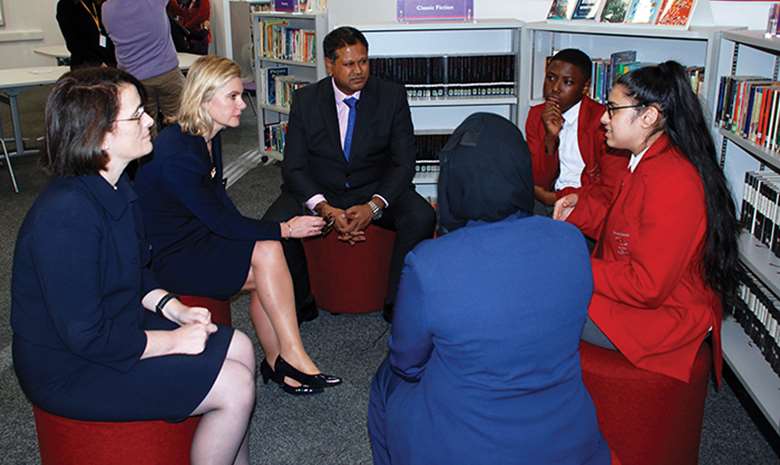Plan for closer school-CAMHS ties
Derren Hayes
Tuesday, January 2, 2018
Advocates of closer working between schools and mental health services outline the benefits it can bring.

The government's green paper on children's mental health, published in December 2017, contains a series of measures aimed at boosting support in schools.
A key proposal, backed with £215m of Department for Education and Department of Health funding, is to create new "mental health support teams" aimed at improving joint working between schools and local child and adolescent mental health services (CAMHS).
The teams will provide a wide range of support and treatments in or near schools and colleges, tackling problems earlier and speeding up referrals to CAMHS.
The government says several thousand people will be recruited over the next five years to form the teams, which could be trained to offer cognitive behaviour therapy (CBT) and other treatments.
A further £95m will be used to train senior school staff to become designated mental health leads.
The idea builds on the approach developed for the CAMHS and Schools Link pilot run by the DfE and DH in 2016. Piloted in 255 schools across 22 areas, it involved a single person taking on responsibility for mental health and managing the relationship with CAMHS.
One of the pilot schools, Swanlea secondary in Whitechapel, east London, has gone further. The school funds an assistant head to run a multi-disciplinary team comprising school staff and mental health professionals from other agencies, including educational psychologists, art therapists and psychotherapists, which meets fortnightly to assess whether pupils need to be referred to CAMHS.
Janet Bergin-Miah, special educational needs co-ordinator at Swanlea, says the range of skills in the team enables the school to offer a raft of specialist social, emotional and mental health early interventions "that are highly effective in preventing needs escalating".
"For example, students who present with anxiety or stress can have art therapy, CBT and other talking therapies through the school leads, and often problems are prevented from escalating to require a CAMHS referral," she says.
Currently, 20 Swanlea pupils out of a school population of around 1,000 are being supported by CAMHS. Issues that typically lead to referral include self-harm, eating disorders, anxiety, post traumatic stress disorder, autism, depression, behaviour problems and psychosis.
However, Bergin-Miah says the threshold for cases to be referred to CAMHS is high, so when a case is not accepted, CAMHS offers advice and guidance to school staff to help them support the child.
This was possible because involvement in the Schools Link pilot saw staff receive mental health training "which increased their confidence in offering specialist interventions".
Bergin-Miah says involvement in the pilot and creation of the multi-disciplinary team has helped improve communication between the school and health services.
"Historically, it was only by chance that the school found out the child was under CAMHS and accessing support. The schools link has changed this as CAMHS now shares information, which informs how we can best support the child at school.
"We have seen this reduce pressure on CAMHS because we are not having the same conversations two or three times with families and among professionals."
The experience of Swanlea School was mirrored nationally, according to a DfE evaluation of the scheme, published in February 2017. Schools piloting the approach reported improvements in knowledge and awareness of mental health issues and understanding of referral routes among staff, and boosted school leads' confidence in supporting children and young people.
Amid rising referrals to CAMHS, government ministers are hoping the green paper proposals are a step towards schools doing more to support pupils so that mental health problems are tackled earlier.
Expert View: Green paper reforms must build on existing practice to prevent young people reaching crisis point
By Catherine Roche, chief executive, Place2Be
It is heartening to see the green paper focusing on supporting children early, before they reach crisis point.
Place2Be's in-school support helps pupils acknowledge and address difficult feelings, to both provide immediate support and help them learn valuable coping skills and resilience that they can carry through their whole lives.
Schools can play a crucial role: creating a culture of openness, identifying potential problems early and providing support in a familiar environment without the stigma often attached to mental health services in the NHS.
But schools cannot manage the growing pressure of children's mental health issues alone. We need to ensure both teachers and school leaders are properly supported and resourced to provide a "whole school approach" to mental health.
The proposal for a "designated senior lead" in every school could be a good start and new mental health support teams could provide helpful additional capacity. But proper training, experience and supervision will be vital to make these roles viable, and must be of sufficient quality and depth to have an impact. Plus, any early intervention needs to be backed by adequately resourced specialist services for onward referrals.
The biggest challenge will be in implementation. Quite rightly, the paper states that "we do not believe there is a single model that should be implemented nationally". We know how important it is to be flexible to schools' individual needs. There is so much excellent work going on already, so we must ensure that new proposals will be truly additional and focused on building on good practice rather than reinventing the wheel or, worse, undoing what is already working well.




